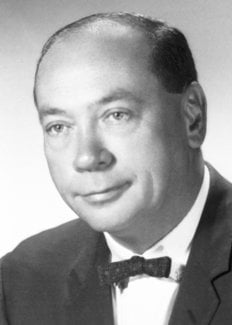Earl W. Sutherland, Jr.
Biographical
| Born: Burlingame, Kansas, November 19, 1915 |
| Married: 1963 |
| Children: 2 sons, 2 daughters |
| Education |
| B.S. Washburn College, 1937 |
| M.D. Washington University, School of Medicine 1942, St. Louis |
| Professional Experience |
| Interneship, Barnes Hospital, 1942 |
| Assistant in Pharmacology, School of Medicine, Washington University 1940-42 |
| Instructor in Pharmacology, School of Medicine, Washington University 1945-46 |
| Instructor in Biochemistry, School of Medicine, Washington University 1946-50 |
| Assistant Professor of Biochemistry, School of Medicine, Washington University 1950-52 |
| Associate Professor of Biochemistry, School of Medicine, Washington University 1952-53 |
| Professor Pharmacology and Director of the Department, School of Medicine, Western Reserve University, Cleveland, Ohio, 1953-63 |
| Professor of Physiology, Vanderbilt University, School of Medicine, Nashville, Tenn., 1963- present |
| Career Investigator – American Heart Association 1967 |
| Memberships |
| American Society of Biological Chemists |
| American Chemical Society |
| American Society for Pharmacology and Experimental Therapeutics |
| AAAS |
| Sigma Xi |
| Alpha Omega Alpha |
| National Academy of Sciences |
| Editorial Board |
| Biochemical Preparations, 1951-56 |
| Journal of Pharmacology and Experimental Therapeutics, 1957-58 |
| Panel of Metabolism, Section on Biochemistry of the Committee on Growth (Nat. Res. Council) 1953-54 |
| Study Section (Pharmacology and Experimental Therapeutics) Public Health Service, 1954-58 |
| Member, National Institutes of Health Pharmacology Training Committee 1958-62, 1963-65 |
| Member, National Institutes of Health Arthritis and Metabolic Disease Program Committee 1966- |
This CV was first published in the book series Les Prix Nobel. It was later edited and republished in Nobel Lectures. To cite this document, always state the source as shown above.

Earl W. Sutherland, Jr. died on 9 March 1974.
Nobel Prizes and laureates
Six prizes were awarded for achievements that have conferred the greatest benefit to humankind. The 14 laureates' work and discoveries range from quantum tunnelling to promoting democratic rights.
See them all presented here.
Explore prizes and laureates
Look for popular awards and laureates in different fields, and discover the history of the Nobel Prize.
